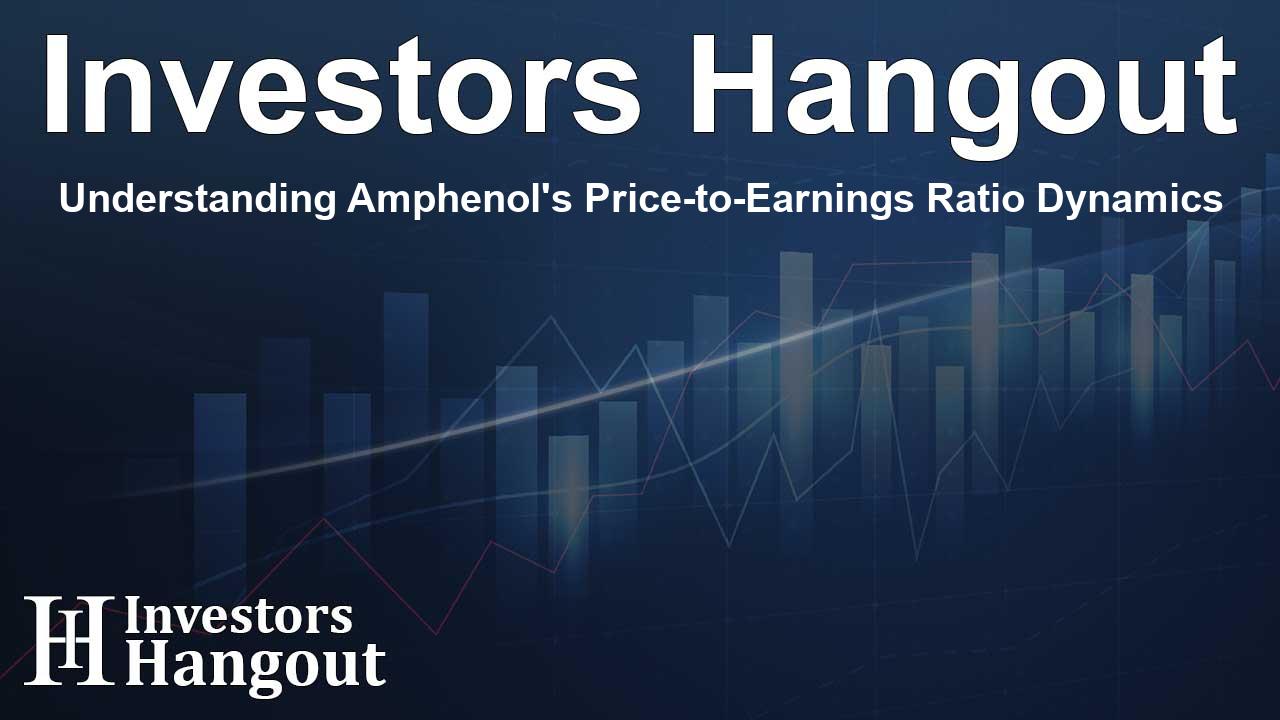Understanding Amphenol's Price-to-Earnings Ratio Dynamics

Market Overview of Amphenol Inc.
Currently, Amphenol Inc. (NASDAQ: APH) has a stock price of $109.30, having experienced a slight decline of 0.05% in today's market session. Despite this minor dip, the past month has seen the company's shares increase by 4.48%, and over the last year, there has been remarkable growth of 65.41%. For existing and potential shareholders, understanding whether the stock is overvalued is essential, especially during times when broader market performance may vary.
P/E Ratio Insights
The Price-to-Earnings (P/E) ratio serves as a crucial metric for long-term investors, enabling them to gauge a company's market performance relative to its earnings history and its industry peers. A lower P/E ratio could suggest that investors are not expecting significant future growth, or it might indicate that the company is currently undervalued. For Amphenol, the P/E ratio stands at 43.57, notably lower than the industry average of 49.78 in the Electronic Equipment, Instruments & Components sector.
Comparative Analysis with Industry Peers
This disparity in P/E ratios can lead to differing interpretations among investors. On one hand, the lower P/E for Amphenol could signal that the stock is lagging behind its industry counterparts in terms of expected performance. Alternatively, it may suggest an undervaluation, presenting potential opportunities for savvy investors.
The Significance of the P/E Ratio
While the P/E ratio is a valuable tool for analyzing market performance, it should not be considered in isolation. Various external factors can influence a company's stock price, such as economic conditions, industry trends, and overall market sentiment. Therefore, investors should combine the P/E ratio with other financial metrics and qualitative analyses when making investment decisions.
Limitations of the P/E Ratio
It's vital to recognize the limitations of relying solely on the P/E ratio. Although a lower value may imply undervaluation, it can also reflect a lack of confidence from shareholders about the company's future performance. Investors are encouraged to investigate additional indicators and to remain informed about industry developments that may impact Amphenol's prospects.
Final Thoughts
In summary, Amphenol's current P/E ratio offers a nuanced view of the company’s market positioning, reflecting both potential risks and opportunities. During fluctuations in the market, understanding these metrics becomes even more critical for making sound financial decisions. As the company continues to evolve, investors will benefit from staying engaged with both the quantitative and qualitative aspects of their investment.
Frequently Asked Questions
What is Amphenol’s current stock price?
Amphenol's current stock price is $109.30.
How has Amphenol's stock performed over the past year?
Over the past year, Amphenol's stock has increased by 65.41%.
What does a low P/E ratio indicate?
A low P/E ratio may indicate that a stock is undervalued or that investors do not expect significant growth in the future.
How does Amphenol's P/E ratio compare to its industry?
Amphenol's P/E ratio is 43.57, which is lower than the industry average of 49.78.
Why should investors not rely solely on the P/E ratio?
Investors should consider additional financial metrics and qualitative factors, as relying solely on the P/E ratio can overlook important insights.
About The Author
Contact Hannah Lewis privately here. Or send an email with ATTN: Hannah Lewis as the subject to contact@investorshangout.com.
About Investors Hangout
Investors Hangout is a leading online stock forum for financial discussion and learning, offering a wide range of free tools and resources. It draws in traders of all levels, who exchange market knowledge, investigate trading tactics, and keep an eye on industry developments in real time. Featuring financial articles, stock message boards, quotes, charts, company profiles, and live news updates. Through cooperative learning and a wealth of informational resources, it helps users from novices creating their first portfolios to experts honing their techniques. Join Investors Hangout today: https://investorshangout.com/
The content of this article is based on factual, publicly available information and does not represent legal, financial, or investment advice. Investors Hangout does not offer financial advice, and the author is not a licensed financial advisor. Consult a qualified advisor before making any financial or investment decisions based on this article. This article should not be considered advice to purchase, sell, or hold any securities or other investments. If any of the material provided here is inaccurate, please contact us for corrections.
